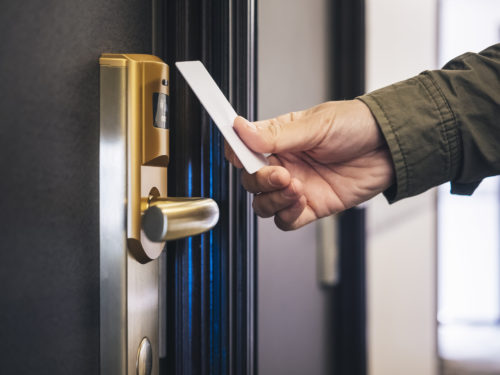Meeting with customers and closing deals motivates most business travelers. However, don’t forget to make personal safety a priority. You’re more vulnerable when you’re on the road, so take steps to protect yourself and your equipment. Crime may seem random, but there’s a lot you can do to limit your chances of becoming a victim. Whether you are at the airport, on the road or at your hotel, here are some tips to follow while traveling to help improve your chances for as safe return home:
AT THE AIRPORT, BUS TERMINAL, LIGHT RAIL STATION OR TRAIN STATION
- Pay attention and watch your bags and laptop carefully at all times.
- Don’t let anyone except uniformed airline personnel handle your bags.
- Watch out for staged mishaps such as someone bumping into you or spilling a drink. It may be a ruse to divert your attention.
- Carry your purse close to your body or your wallet in an inside front pocket. An even better approach is to wear a money pouch under your clothes.
- Keep a duplicate record of checked luggage contents. Keep medication or anything valuable in a carry-on that stays with you.
- Avoid displaying expensive cameras, cellphones, jewelry, luggage, etc. that could draw attention. Your goal is to blend in with the crowd.
- Don’t advertise your plans and whereabouts on social media. Such postings can be monitored by people who could harm you. There’s plenty of time to post after you return.
- Be familiar with your travel route before you start. Study Google or another map source beforehand.
- Make sure your rental car is in good operating condition. Learn how to operate all windows, door locks, ignition, gas cap door, etc. before you leave the lot.
- Keep your maps and rental agreement concealed rather than lying on the seat or the dashboard.
- Keep car doors locked while you are driving. Store your luggage and laptop in the truck. • Park in well-lighted areas only, close to building entrances and walkways.
- Have car keys ready when approaching your car. Check the back seat and floors before getting in the vehicle.
- If you are bumped by another car, think before you get out. If you are in doubt or uncomfortable, signal the other driver to follow you to a nearby police station or a busy, well-lit area you judge safe before stepping out your car.
Don’t advertise your plans and whereabouts on social media. Such postings can be monitored by people who could harm you. There’s plenty of time to post after you return.


AT THE HOTEL
- Insist hotel staff write down your assigned room number so others can’t see or hear it.
- Never leave luggage unattended.
- Keep all hotel doors and windows locked, and use all door locks.
- Locate floor fire exits, elevators, and public phones in case of emergency.
- Make sure your room has a peephole/indoor viewer and a dead bolt lock.
- Keep valuables-jewelry, cash, etc. in the hotel safe. Better idea: leave non-essential jewelry in a safe at home.
- Ask hotel staff about the safety of the neighborhood and what areas to avoid.
- Before you take a cab, ask the hotel staff about directions and estimated costs.
- Always verify who’s at your room door. Don’t open the door to someone you don’t know. If an unexpected visitor claims to be a hotel employee, call the front desk to make sure.
- Don’t display room keys in public or leave them on restaurant tables, at the swimming pool or similar places they can easily be stolen.
- Don’t work out in the exercise room alone, especially late at night.
- If you lose the plastic key card to your room, insist on a new-keyed card.
IMPORTANT ADDITIONAL OVERSEAS TRAVEL NUMBERS AND PLANNING:
- The U.S. Department of Transportation has a Travel Advisory and Airport Safety Hotline (800-221-0673) that advises international travelers of known, credible threats and potentially dangerous airports and countries.
- The U.S. Department of State operates a Citizens’ Emergency Center (202-647-0900) that offers emergency situation assistance to travelers abroad as well as travel advisories and alerts for various countries.
- Be familiar beforehand with local laws and customs of the country in which you’re traveling. Often simply being aware of potential crime dangers and alert to what you can do to manage them will go a long way to making your business trip both successful and safe.